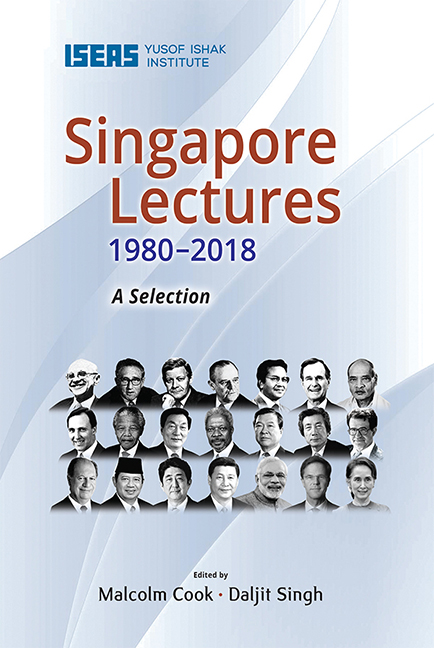Book contents
- Frontmatter
- Contents
- Introduction
- 1 The Invisible Hand in Economics and Politics
- 2 American Foreign Policy: A Global View
- 3 The Soviet Union: Challenges and Responses as Seen from the European Point of View
- 4 Trends in the International Financial System
- 5 Regionalism, Globalism and Spheres of Influence: ASEAN and the Challenge of Change into the 21st Century
- 6 US Policy in the Asia-Pacific Region: Meeting the Challenges of the Post-Cold War Era
- 7 India and the Asia-Pacific: Forging a New Relationship
- 8 Australia, Asia and the New Regionalism
- 9 South and Southern Africa into the Next Century
- 10 China and Asia in the New Century
- 11 Global Values: The United Nations and the Rule of Law in the 21st Century
- 12 Peace on the Korean Peninsula and East Asia
- 13 Japan and ASEAN in East Asia: A Sincere and Open Partnership
- 14 EU and Asia: Sharing Diversity in an Inter-regional Partnership
- 15 Global Challenges in the 21st Century: A View from Chile
- 16 Indonesia: The Challenge of Change
- 17 Japan and ASEAN, Always in Tandem: Towards a More Advantageous Win-Win Relationship through My “Three Arrows”
- 18 Forging a Strong Partnership to Enhance Prosperity of Asia
- 19 India’s Singapore Story
- 20 The Netherlands, Singapore, Our Regions, Our World: Connecting Our Common Future
- 21 Democratic Transition in Myanmar: Challenges and the Way Forward
- The Singapore Lecture Series
- The Editors
9 - South and Southern Africa into the Next Century
Published online by Cambridge University Press: 09 October 2021
- Frontmatter
- Contents
- Introduction
- 1 The Invisible Hand in Economics and Politics
- 2 American Foreign Policy: A Global View
- 3 The Soviet Union: Challenges and Responses as Seen from the European Point of View
- 4 Trends in the International Financial System
- 5 Regionalism, Globalism and Spheres of Influence: ASEAN and the Challenge of Change into the 21st Century
- 6 US Policy in the Asia-Pacific Region: Meeting the Challenges of the Post-Cold War Era
- 7 India and the Asia-Pacific: Forging a New Relationship
- 8 Australia, Asia and the New Regionalism
- 9 South and Southern Africa into the Next Century
- 10 China and Asia in the New Century
- 11 Global Values: The United Nations and the Rule of Law in the 21st Century
- 12 Peace on the Korean Peninsula and East Asia
- 13 Japan and ASEAN in East Asia: A Sincere and Open Partnership
- 14 EU and Asia: Sharing Diversity in an Inter-regional Partnership
- 15 Global Challenges in the 21st Century: A View from Chile
- 16 Indonesia: The Challenge of Change
- 17 Japan and ASEAN, Always in Tandem: Towards a More Advantageous Win-Win Relationship through My “Three Arrows”
- 18 Forging a Strong Partnership to Enhance Prosperity of Asia
- 19 India’s Singapore Story
- 20 The Netherlands, Singapore, Our Regions, Our World: Connecting Our Common Future
- 21 Democratic Transition in Myanmar: Challenges and the Way Forward
- The Singapore Lecture Series
- The Editors
Summary
Nelson R. Mandela, the President of the Republic of South Africa, delivered the 16th Singapore Lecture on 6 March 1997. He was introduced to the audience by Singapore's Deputy Prime Minister and Defence Minister Dr Tony Tan. President Mandela was the first of two African leaders to give a Singapore Lecture, followed in 2005 by his successor President Thabo M. Mbeki. President Mandela speaks of his vision for South and Southern Africa and the need to re-establish and strengthen the historical ties between Africa and Asia.
Master of Ceremonies, Distinguished Guests, Ladies and Gentlemen.
Long years ago, trade and other relations existed between Asia and Southern Africa—relations that we are only now starting to fully appreciate. In our own country, recent excavations have attested to the existence of kingdoms with advanced mining, smelting and other skills, along part of the highway from the coast to Southern Africa's great settlements in the hinterland. Some of the pottery and other artefacts discovered here had their origins in the dynasties of Asia, as evidence to the trade and exchange of skills that existed at the turn of the last millennium.
Our people are proud to uncover a history all along concealed. They are proud to establish that, contrary to conventional wisdom, they were a full and active part of Africa's relations with the world, long before European settlers set their foot on the continent. Then came the interregnum of colonial plunder which not only brought untold suffering to the African peoples, but also destroyed the international relations across the wide frontiers of seas and oceans.
During this interregnum, Africa found itself tied to Europe's colonial apronstrings: its trade, diplomatic relations, education and culture were systematically remade in the image of the colonial victors. But it was an interregnum, too, when colonizers who, as unwitting tools of history, brought new technological and communication skills that have redefined the world. Now as we stand at the threshold of a new millennium, we are fortunate witnesses to the rebirth of natural relations between Africa and Asia, relations which colonialism sought to mediate in its own interest.
- Type
- Chapter
- Information
- Singapore Lectures 1980-2018 , pp. 145 - 158Publisher: ISEAS–Yusof Ishak InstitutePrint publication year: 2020

